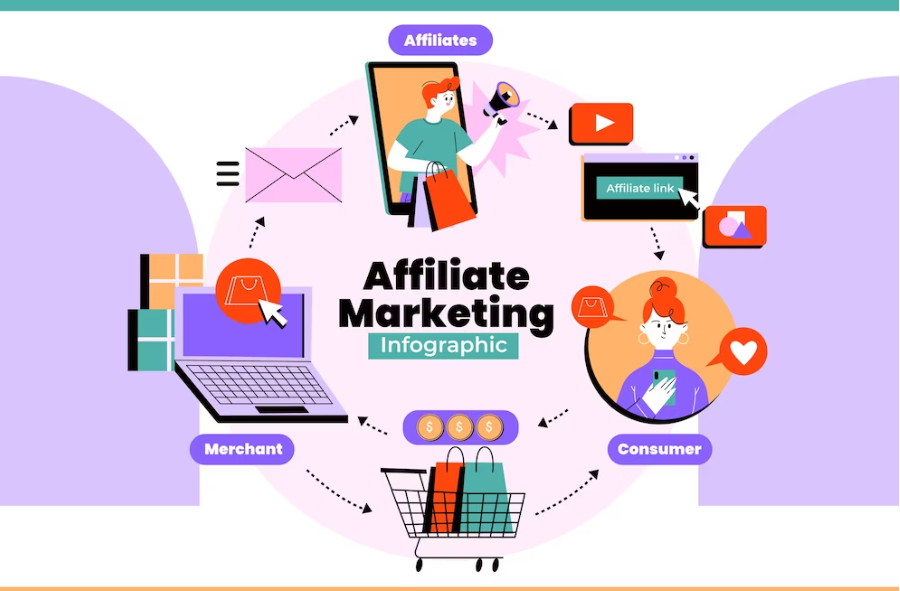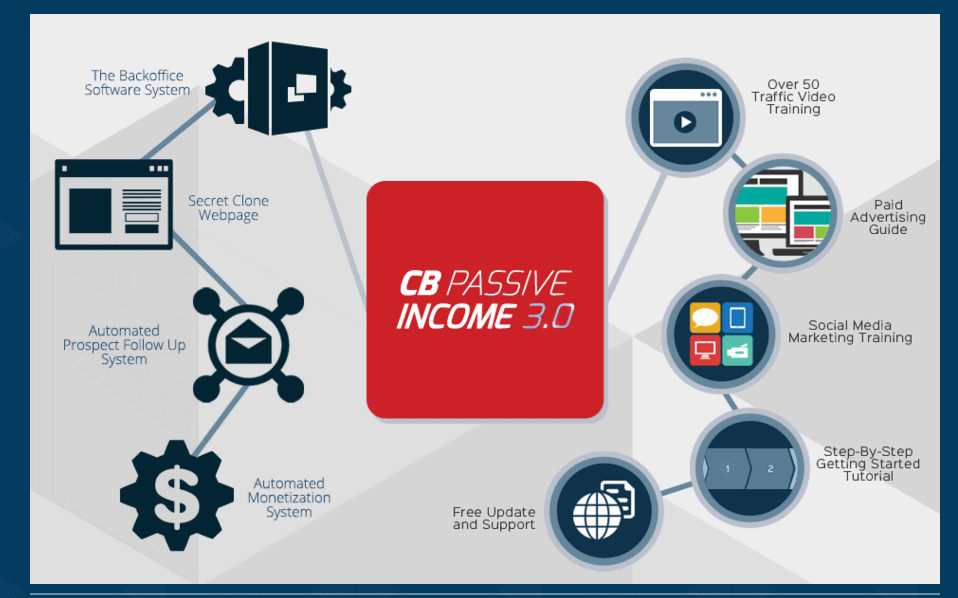Are you interested in learning how to become an affiliate marketer?
In this comprehensive guide, we will explore the ins and outs of affiliate marketing, including what it is, how it works, and the different types of affiliate marketing.
I’ll also provide practical steps on how to get started as an affiliate marketer, the benefits of affiliate marketing, as well as the challenges you may encounter. I’ll share valuable tips on how to be successful in this dynamic and rewarding industry.
Whether you’re a seasoned marketer or just starting out, this article will provide you with the essential knowledge and strategies to thrive as an affiliate marketer.
Content Outline
Key Takeaways:
- Choose a profitable niche and research potential affiliate programs before getting started.
- Build a website or blog to showcase your content and promote your affiliate links.
- Be transparent with your audience and continuously learn and adapt to stay successful in the ever-changing affiliate marketing industry.
What Is Affiliate Marketing?

Affiliate marketing is a performance-based marketing strategy where affiliates promote products or services and earn a commission for every sale or action generated by their affiliate links. Through a specific niche and audience, individuals can monetize their website or content.
Now, for people who are just starting with affiliate marketing, think of it like a salesperson for things you find online. You tell people about products or services through special links on your website or blog.
When someone buys something or signs up through your link, you get paid a little bit by the company that sells the product. It’s a cool way for people like me to make money from our websites or social media.
The core principle of affiliate marketing lies in the concept of revenue sharing, where the affiliate is rewarded for driving customer actions, such as sales, leads, or clicks, for the merchant. The commission structure varies, with some programs offering a percentage of the sale while others provide a fixed amount per conversion.
Niche selection is crucial, as it allows affiliates to focus on a specific audience, enhancing the relevance and effectiveness of their promotional efforts. Crafting engaging content that seamlessly integrates affiliate links is essential for building trust and driving conversions.
How Does Affiliate Marketing Work?
Affiliate marketing operates through a simple yet effective mechanism where affiliates join affiliate programs or networks, generate traffic to the merchant’s products or services, and earn revenue through commissions. This process enables affiliates to build a sustainable source of passive income.
How do you get started as an Affiliate Marketer?
In order to succeed as an affiliate marketer, you must take deliberate steps, such as selecting a niche, establishing affiliate relationships, and leveraging various marketing channels, including SEO, email marketing, and podcasts, to drive traffic.
1. Choose A Niche

The first step in becoming an affiliate marketer is to choose a niche that aligns with your interests, allowing you to promote relevant products or services to a targeted audience effectively.
When selecting a niche, it’s crucial to consider your own passions and areas of expertise, as this will make it easier to create authentic and engaging content. Understanding the needs and preferences of your target audience within the chosen niche is paramount.
It’s essential to conduct thorough research to determine the demand for certain products or services within the niche and to identify the most effective ways to reach and resonate with your audience.
By creating engaging content that provides value and addresses the pain points of your audience, you can build trust and credibility, leading to more successful affiliate marketing endeavors.
2. Research Affiliate Programs
Researching and selecting appropriate affiliate programs or networks is crucial for identifying the right products or services to promote as an affiliate marketer.
When choosing affiliate programs, it’s essential to consider various factors, such as the relevance of the products or services to your target audience, the commission structures offered, and the level of affiliate support provided.
By thoroughly researching and comparing different programs, you can ensure that you align with reputable and reliable networks that not only offer attractive commissions but also provide resources and assistance to help you succeed in your affiliate marketing endeavors.
3. Build A Website Or Blog

Establishing a website or blog serves as a foundational platform for affiliate marketers to create and share engaging content that resonates with their target audience.
When developing a website or blog, affiliate marketers gain the opportunity to craft compelling articles, videos, or infographics that cater to the specific interests and needs of their audience. Quality content plays a pivotal role in attracting potential customers and improving search engine rankings.
Through the blog, they can also establish themselves as authorities in their niche, building trust and credibility among their followers. A well-designed website enhances brand representation, creating a unique digital identity that sets them apart from competitors.
4. Create Quality Content

Crafting high-quality content is essential for affiliate marketers to engage their audience and effectively promote products or services across various platforms, including SEO, social media, email marketing, and podcasts.
High-quality content serves as the cornerstone of successful affiliate marketing. By creating engaging and informative material, marketers can capture the attention of their target audience and build trust, ultimately driving conversions.
In the realm of SEO optimization, compelling content can enhance the visibility of affiliate sites, leading to higher organic traffic and improved search engine rankings.
In the era of social media dominance, potent content can spark conversations, encourage shares, and foster a loyal community.
Whether through engaging blog posts, eye-catching videos, or captivating infographics, great content can fuel the social media presence of affiliate marketers, garnering attention and boosting engagement.
Email marketing campaigns can experience greater success when populated with valuable, relevant content, establishing a deeper connection with subscribers and increasing the likelihood of conversions.
With the exponential growth of podcasts, creating compelling audio content has become an essential avenue for affiliate promotion. You can see my partner’s podcast here, where we discuss all about affiliate marketing.
Marketers can drive traffic to affiliate offers by telling stories, conducting informative discussions, and interviewing experts.
5. Promote Your Affiliate Links

Promoting affiliate links involves leveraging various marketing channels to reach potential consumers, collaborating with publishers and advertisers, and implementing tracking cookies to monitor conversions and commissions.
Collaborating with publishers is a crucial aspect of affiliate link promotion. Sourcing high-quality content from reputable publishers can significantly enhance the visibility of affiliate links, increasing the likelihood of conversion.
Engaging with advertisers is equally important. By fostering strong relationships with advertisers, affiliate marketers can access exclusive offers and promotional materials, ultimately improving the performance of their affiliate links.
The utilization of tracking cookies provides valuable insights into consumer behavior, enabling marketers to refine their strategies for optimal performance analysis.
What Are The Benefits Of Affiliate Marketing?
Aspiring entrepreneurs find affiliate marketing attractive because of its numerous advantages, including passive income, flexibility in work arrangements, low startup costs, and lack of inventory and shipping requirements.
1. Passive Income

One of the primary benefits of affiliate marketing is the potential to generate passive income through consistent revenue streams facilitated by effective participation in affiliate programs or networks.
This passive income is attained through the process of earning commissions from promoting other companies’ products or services. As an affiliate marketer, the individual benefits from a pre-defined commission structure, typically based on the performance of the marketing efforts.
The commission can be a fixed amount per sale, a percentage of the sale, or even recurring commissions for subscription-based products.
Such revenue generation does not necessitate constant active involvement, allowing affiliate marketers to earn money even while sleeping or on vacation. Over time, sustained engagement in affiliate marketing can lead to a reliable and profitable source of income, providing financial stability and security for the long term.
2. Flexibility
Affiliate marketing provides individuals with the flexibility to manage their promotional activities, establish affiliate relationships, and leverage diverse marketing channels such as influencer marketing, social media, and email newsletters to reach their audience.
This form of marketing allows individuals to tap into their creativity, forming partnerships with a wide range of businesses and brands. With the autonomy to choose products and services that align with their niche, affiliates can effectively showcase these offerings through authentic and engaging content.
The integration of influencer marketing opens new doors for collaboration, enabling affiliates to leverage the trust and credibility of influencers within their niche to expand their reach and engage with a broader audience.
3. Low Start-Up Costs
Affiliate marketing presents a low barrier to entry, with minimal start-up costs related to niche selection, website development, and content creation, enabling aspiring marketers to establish their presence without significant financial investment.
By carefully identifying a niche of interest and demand, individuals can focus their efforts on a targeted audience, optimizing cost-effectiveness through tailored content and marketing strategies.
The establishment of a website, often achievable with affordable hosting services and user-friendly platforms, further reinforces the affordability of affiliate marketing ventures.
The creation of engaging and valuable content can be largely conducted at minimal expense, leveraging creativity and skill rather than substantial monetary resources.
4. No Inventory Or Shipping Required
Unlike traditional businesses, affiliate marketing alleviates the burden of managing inventory or handling shipping logistics, enabling marketers to focus solely on promoting products or services without the accompanying operational complexities.
This eliminates the need for warehousing, packaging, and shipping arrangements, allowing marketers to direct their efforts toward consumer engagement, content creation, and marketing strategies.
With affiliate marketing, individuals can capitalize on the established infrastructure and customer base of the merchant, saving time and resources that would otherwise be spent on inventory management and fulfillment.
By focusing solely on promotion, affiliate marketers can tap into a wide range of products and services, tailoring their efforts to reach specific audience segments and maximize their earning potential through strategic marketing approaches.
How To Be Successful As An Affiliate Marketer?
Achieving success as an affiliate marketer involves the strategic promotion of quality products, maintaining transparency with the audience, and embracing a continuous learning mindset to adapt to industry shifts and consumer demands.
1. Choose Quality Products To Promote
Selecting and promoting quality products or services through reputable affiliate programs and collaborations with trusted publishers and advertisers is fundamental to establishing credibility and driving conversions as an affiliate marketer.
By offering quality products, affiliate marketers can build a loyal customer base and foster a positive reputation within their niche.
The partnership with publishers and advertisers plays a crucial role in ensuring that the products being promoted align with the target audience’s needs and preferences, thereby increasing the likelihood of successful conversions.
The credibility of the promoted products greatly influences the trust and confidence of potential customers, directly impacting conversion rates and revenue generation.
2. Be Transparent With Your Audience
Maintaining transparency with the audience regarding affiliate promotions, disclosure of tracking cookies, and the honest portrayal of product benefits fosters trust and credibility, essential components for successful affiliate marketing interactions with consumers.
Transparency is the cornerstone of ethical affiliate marketing, ensuring that consumers feel informed and given the power to make purchasing decisions.
By openly disclosing any financial incentives or partnerships, affiliate marketers build a foundation of trust with their audience, reinforcing the genuine nature of their recommendations.
Transparent practices in affiliate marketing contribute to enhanced consumer trust, loyalty, and long-term brand relationships.
When audiences perceive honesty and authenticity in affiliate promotions, they are more likely to engage with the products or services recommended, recognizing the marketer’s commitment to their best interests.
3. Continuously Learn And Adapt
Committing to continuous learning and adaptation is pivotal for affiliate marketers to stay informed about industry trends, strengthen affiliate relationships, and leverage platforms for relevant insights and skill development. You can keep on reading my website, AffiliateBay, to get insight tips on affiliate marketing.
Industry insights play a crucial role in understanding the ever-evolving landscape of affiliate marketing. Staying up-to-date with the latest trends can help marketers anticipate shifts in consumer behavior and adjust strategies accordingly, ultimately making campaigns more effective.
I make sure that I research well and stay up-to-date with the latest on affiliate marketing by attending affiliate conferences and reading a lot about the latest things. So, you can trust my website with authentic information.
Building trust and collaboration with affiliate partners enhances the performance of marketing initiatives. It is my goal to provide valuable resources here to equip power to marketers with the knowledge and tools they need to thrive in this competitive industry.
FAQs
🙆♀️ How can I track my affiliate earnings?
Most affiliate programs provide a dashboard or tracking system where you can monitor your clicks, conversions, and earnings. You can also use tools such as Google Analytics to track your affiliate links and measure your success.
🤟 What is affiliate marketing and how can I become an affiliate marketer?
Affiliate marketing is the process of earning a commission by promoting another company’s products or services. To become an affiliate marketer, you can sign up for affiliate programs through various companies and receive a unique affiliate link to share with your audience.
💁♀️ How do I choose the right affiliate program to join?
When choosing an affiliate program, consider the products or services being offered, the commission rates, and the reputation of the company. It’s also important to select a program that aligns with your niche and target audience to increase your chances of success.
👉 What are some effective ways to promote my affiliate links?
Some effective ways to promote your affiliate links include creating valuable content, utilizing social media platforms, collaborating with other bloggers or influencers, and using email marketing. It’s important to diversify your marketing efforts to reach a wider audience.
🙋 Is there a cost to become an affiliate marketer?
No, there is no cost to become an affiliate marketer. You can join most affiliate programs for free. However, it’s important to note that some programs may require a certain amount of website traffic or social media following before accepting you as an affiliate.
🙆♀️ What are some common mistakes to avoid as an affiliate marketer?
Some common mistakes to avoid as an affiliate marketer include promoting irrelevant products, not disclosing your affiliate links, and not building a relationship with your audience. It’s important only to promote products or services that you personally believe in and to be transparent about your affiliate partnerships.
Conclusion- How To Become an Affiliate Marketer In 2026?
From what I’ve learned, becoming an affiliate marketer is a great way to earn some extra money without too much hassle.
You need to find good companies to partner with, use the right tools to help you out, and have a plan for how to talk about the products you like to your followers.
If you do it right, you can make money while sharing things you already enjoy with people who are interested in what you have to say. It’s pretty cool and definitely worth a try!


